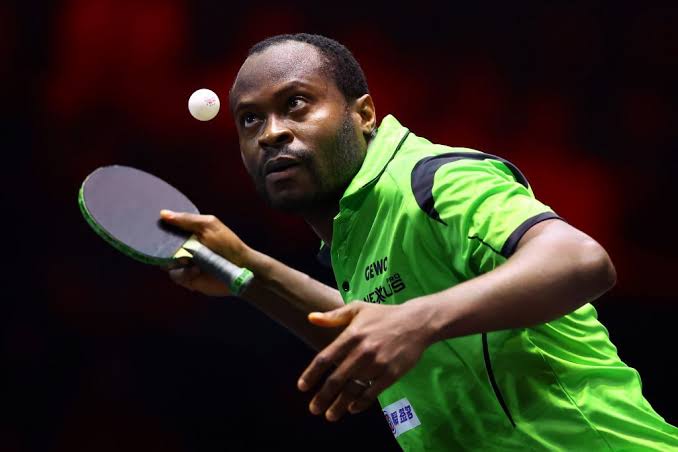Quadri Aruna, Nigeria’s prominent table tennis star, has publicly voiced his profound disappointment regarding the lack of governmental support throughout his illustrious career. Despite achieving consistent international success and raising the profile of Nigerian table tennis on the global stage, Aruna’s journey has been marked by a stark absence of financial and logistical backing from the Nigerian government. This contrasts sharply with the substantial support he has received from private individuals and sponsors, who have played a pivotal role in his development and achievements. Aruna’s candid revelations shed light on the systemic neglect of athletes in Nigeria and underscore the urgent need for reform and increased investment in sports development.
Aruna’s narrative, shared through a poignant Facebook post, details a career built on resilience, self-reliance, and the generosity of individual benefactors. He recounts his early days in Portugal, where he began his professional career, highlighting the crucial financial support provided by Barrister Wahid Enitan Oshodi, the current president of the Africa Table Tennis Federation. This assistance enabled Aruna to compete regularly in international tournaments, gaining valuable experience and honing his skills. What is particularly striking, and indeed concerning, is Aruna’s revelation that he competed in the vast majority of these tournaments without the guidance of a coach, a direct consequence of the Nigerian government’s failure to provide funding.
The absence of a coach is a recurring theme in Aruna’s account, underscoring the significant disadvantage he faced compared to his international competitors. He recounts instances where private sponsors stepped in to fill the void left by the Nigerian government, such as at the 2014 World Cup in Dusseldorf, where his former sponsor, Joola, provided a German coach, and Oshodi covered his travel and accommodation expenses. This support proved instrumental in Aruna’s impressive run to the quarterfinals of the tournament, demonstrating the tangible impact of proper coaching and resources on an athlete’s performance. The fact that Aruna had to rely on private individuals to access basic necessities like coaching underlines the systemic failures within Nigerian sports administration.
The pattern of governmental neglect continued throughout Aruna’s career. He reveals that Nigeria typically only funded his participation in one tournament per year, usually an African tournament, leaving him to shoulder the financial burden for the rest, often with the assistance of his sponsor, GEWO. This lack of consistent financial support forced Aruna to make difficult choices, including competing without a coach and personally covering travel expenses, even for major international events like the World Championships. This self-funded approach speaks volumes about Aruna’s dedication and commitment to his sport, but it also highlights the missed opportunities for Nigeria to capitalize on his talent and achieve greater international sporting success.
One particularly illustrative incident is Aruna’s experience at the 2025 World Championships in Doha. He had to purchase his own ticket to the tournament because Nigeria failed to procure it in a timely manner. While he initially had a coach, Dotun Omoniyi, for the first two matches, the Nigerian authorities reportedly refused to cover the costs of changing Omoniyi’s flight, forcing him to return to Nigeria. Undeterred, Aruna resourcefully paid a friend from Togo to coach him for the remaining matches, ultimately reaching the round of 16. This episode not only demonstrates Aruna’s resilience and resourcefulness but also exposes the short-sightedness and inefficiency of the Nigerian sports authorities. Their unwillingness to invest a relatively small amount in extending his coach’s stay potentially cost Aruna a chance to progress further in the tournament, depriving Nigeria of a potential medal and international recognition.
Aruna’s story is not an isolated incident. It echoes the experiences of other Nigerian athletes who have faced similar challenges due to inadequate support from the government and sports federations. The recent case of Favour Ofili, the world record holder in the women’s 150m, who switched her nationality to Turkey citing negligence from the Athletics Federation of Nigeria and the Nigeria Olympic Committee, further reinforces the systemic nature of the problem. These athletes’ narratives underscore the urgent need for comprehensive reforms within Nigerian sports administration, including increased funding, improved logistical support, and a more athlete-centric approach to development. Aruna’s call for greater investment in young athletes is a crucial message – Nigeria must nurture its emerging talents and provide them with the necessary resources to reach their full potential, avoiding a repeat of the neglect that has hampered his own career. Only through such proactive measures can Nigeria hope to achieve lasting success on the global sporting stage.


